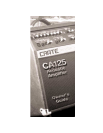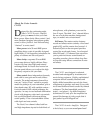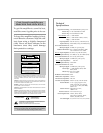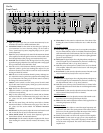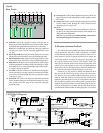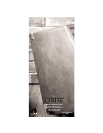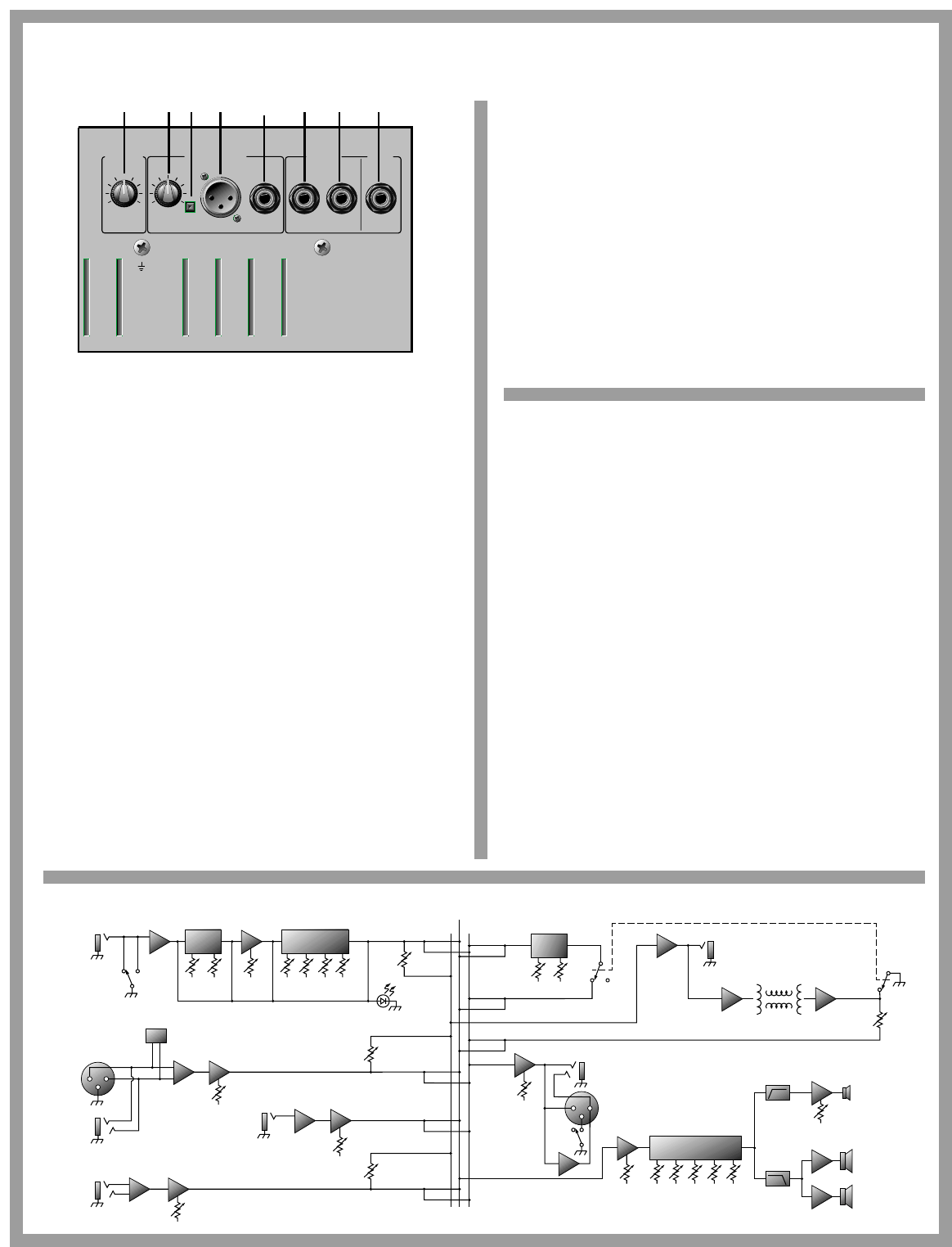
On the
Rear Panel:
Return
Send
Low Z
Bal.
Gnd
Lift
High Z
Bal.
Reverb/
Chorus
Line OutputsTweeter
Effects
Loop
Foot
Switch
Level
0 10
Level
-50dB 0dB
-6dB
34 33 31 30 29 28 2732
27: Footswitch. Connect the supplied two-button footswitch here for
remote on/off control of the internal reverb and chorus. (When connect-
ed, the footswitch overrides the front panel chorus on/off switch.)
Note: This is a STEREO jack: tip controls the chorus, ring controls the
reverb, sleeve is ground. Use only a footswitch equipped with a stereo
1/4” plug.
28: Effects Loop Send. When using an external signal processor, connect
this jack to the input of the effect by means of a shielded signal cable.
29: Effects Loop Return. When using an external signal processor, connect
this jack to the output of the effect by means of a shielded signal cable.
30: High Z Bal. Use this jack to connect a high impedance, line level signal
to a house sound board, a recording console or an external power ampli-
fier by means of an 1/4” stereo plug-terminated cable. (Ring is signal +,
tip is signal -, and sleeve is ground.)
31: Low Z Bal. Use this jack to connect a low impedance, line level signal to
a house sound board, a recording console or an external power amplifi-
er by means of an XLR-terminated cable. (Pin 1 is ground, pin 2 is signal
+, and pin 3 is signal -.)
32: Ground Lift. This switch, when depressed, electronically disconnects
the low Z balanced output jack’s chassis ground connection. If you expe-
rience excessive noise when using the low Z balanced output jack,
depress this switch.
CA125 Block Diagram:
effects
line out
master
instrument
channel
input
aux channel
active piezo
freq cut
filter
gain low mid cntr
peak
high
rev/
effect
send
vocal/aux
channel
low-z
input
hi-z
input
phantom
power
tones
80 330 1k
Hz
4k 10k
level
graphic EQ
rev/
effect
send
hi-z
input
gain
gain
effect
return
effect
return
master
level
50w
25w
high pass
hi-freq
driver
low-freq
driver
low-freq
driver
reverb
return
effects
send
spring reverb
low-z
bal.
gnd
lift
hi-z
bal.
level
line out
rev/
effect
send
50w
depth rate
chorus
on off
low pass
foot
switch
To Eliminate Instrument Feedback:
One of the most common problems encountered when amplifying
acoustic instruments, especially in small environments, is feedback.
Acoustic instruments typically have inherent qualities which cause res-
onant feedback at specific frequencies. Instrument tone controls and
sound board equalizers are helpful in getting rid of the problem, but
they typically operate around relatively wide frequency bands. This
almost always means the musician must sacrifice sound quality in his
quest to do away with feedback. But since Crate’s feedback elimination
circuit isolates only the offending frequency, instrument feedback from
the CA125 can be eliminated without affecting the overall sound.
Chances are, you may not have a problem with feedback at all. In
that case, leave the CA125’s Freq and Cut controls fully counter-clock-
wise. However, if you do encounter feedback while playing, set the Cut
control to -30dB (fully clockwise) and adjust the Freq control until the
feedback is gone. Reduce the Cut to the 12 o’clock position and readjust
the Freq control as needed. Continue reducing the Cut control and read-
justing the Freq control until there is no more feedback with the Cut con-
trol as far counter-clockwise as possible. This approach effectively elimi-
nates instrument feedback without sacrificing the quality of your sound.
33: Line Out Level. Use this control to adjust the output level of the line out
signal. (This control works independently from the amplifier’s master
level control.)
34: Tweeter Level. Use this control to adust the signal output level from the
CA125’s internal tweeter. Rotating this control counter-clockwise
reduces the tweeter’s output level.
Not Shown:
Power cord. Connect the end of this cord to a suitable source of line volt-
age. Refer to the voltage information on the back of the amplifier for its
voltage and current requirements.
Note: This is a grounded plug. To avoid the possibility of electric shock,
DO NOT defeat the ground connection in any way!



